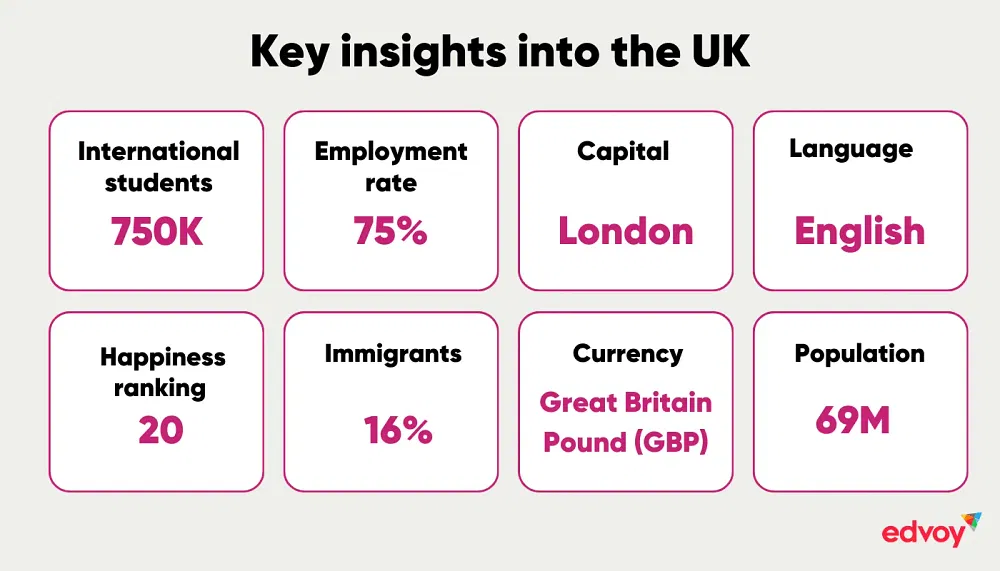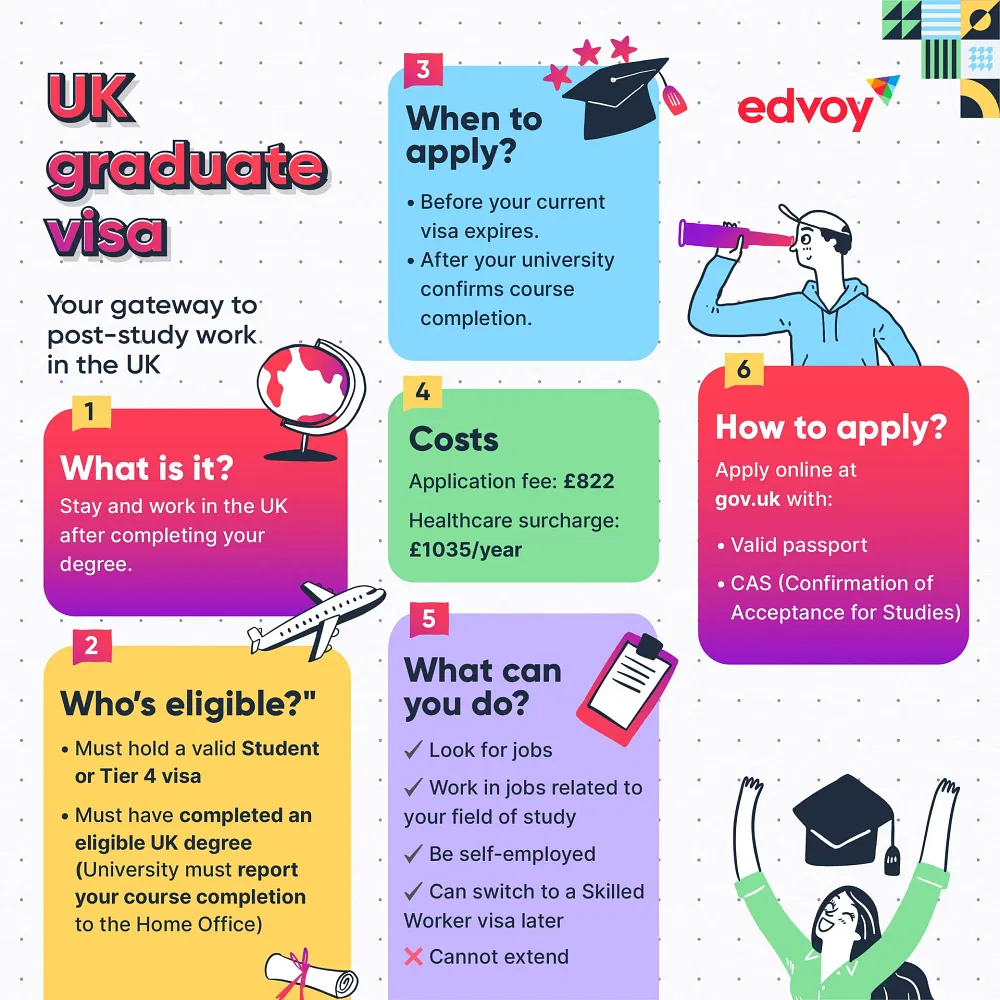The United Kingdom is an incredibly popular destination for international students, and it's easy to see why. If you’re considering studying abroad, the UK offers an impressive range of options. These institutions aren't just known for their history; they lead in cutting-edge research. But it’s not just about the education. The country is one of the top preferred study destinations for international students like you. Take a look at a few key insights about the UK.

Get a complete guide to studying in the UK.
Moving to the UK for your studies is a big step. If you’re curious about knowing more, you may have a lot of questions about how things work. Don’t worry, our experts have broken it down for you. Just click on the topics that interest you and find all the key information you need.
| Employment opportunities in the UK | Cost of living in the UK |
| Education system in the UK | Best courses in the UK |
| Best universities in the UK | Student visa in the UK |
Getting your Student visa is an important step in this process. Once an educational institution in the country has accepted you, you can apply for the UK Student visa. If you’re concerned about understanding the visa process in the UK, don’t worry. We’ve got you covered. Read on to learn more about it.
Types of Student visas in the UK
In the UK, there are two main types of Student visas for different study durations. The type of visa you need will depend on the length of your course and your specific study plans.
Here is a breakdown of the two types of UK Student visas:
| Visa type | Description |
|---|---|
| Short-term study visa | This visa is for short courses of up to 6 months, such as language courses or short-term training. |
| Student visa (formerly tier 4) | This visa is for courses that last more than 6 months, such as undergraduate and postgraduate, and is the most common visa for international students. |
UK Student visa requirements
To get a UK Student visa, you must provide proof of your admission into a recognised educational institution, proof of financial means to support yourself during your stay, and evidence of English language proficiency.
You must also submit a valid passport, payment for the visa application fee, and tuberculosis (TB) test results if applicable. Additionally, you’ll need to provide accommodation details for your stay in the UK.
Make sure all your documents are up to date and comply with the UK government’s guidelines to avoid processing delays. Let’s now take a detailed look at the requirements.
Required documents for a UK Student visa
- Passport: Ensure your passport is valid for the duration of your stay in the UK
- Visa application form: Signed and completed online
- Photographs: Recent passport-sized photos
- Confirmation of Acceptance for Studies (CAS): A unique reference number provided by your UK university or educational institution
- Proof of financial support: Bank statements or evidence showing you have enough funds to cover tuition fees and living costs
- English language proficiency: Test results from an approved English language test, such as IELTS
- Academic transcripts and certificates: Copies of your previous academic records
- TB test results (if applicable): Required for students from certain countries
- Health insurance: Proof of comprehensive health insurance for the duration of your stay in the UK, along with the Immigration Health Surcharge (IHS) payment
- Visa application fee payment: Proof of payment for the visa application fee
- Accommodation proof: Evidence of where you will be living during your studies, such as a rental agreement or accommodation offer
Studying abroad isn’t just a dream—it’s your future. Let’s make it happen!
Language tests accepted in the UK
Demonstrating your proficiency in English through standardised language tests is a crucial step when applying for English-taught courses in the UK. The most widely accepted tests include IELTS, TOEFL iBT, PTE Academic, Duolingo English Test, and Cambridge Exams (C1 Advanced, C2 Proficiency).
For undergraduate courses, universities typically require an IELTS score of 6.0-6.5, while for postgraduate courses, the required score usually ranges from 6.5-7.0. See the table below for more details.
| Test | Required scores (Undergraduate) | Required scores (Postgraduate) |
|---|---|---|
| IELTS | 6.0-6.5 (minimum 5.5 in each band) | 6.5-7.0 (minimum 6.0 in each band) |
| TOEFL iBT | 79-90 | 90-100 |
| PTE Academic | 55-63 | 63-65 |
| Duolingo | 100-110 | 110-120 |
| Cambridge Exams (C1 Advanced, C2 Proficiency) | Grade C or above | Grade B or above |
Financial requirements for a UK Student visa
To obtain a UK Student visa, you must prove that you have sufficient financial resources to cover both your tuition fees and living expenses. If you’re about to study in London, you’ll need to prove that you have GBP 1334 per month for living expenses, in addition to your tuition fees. To study outside London, you must show GBP 1023 per month for living expenses, along with tuition fees.
You’ll have to provide your recent bank statements showing sufficient funds to cover tuition and living expenses. This must be from your personal bank account or a sponsor’s account.
If a sponsor is funding your studies, you must provide a letter confirming their support, along with their financial documents. In case you have received a scholarship, include proof of the scholarship and the amount awarded.
Step-by-step visa application process
The UK Student visa application process involves submitting your documents online, attending a biometric appointment, and waiting for a decision on your visa. Follow each step to make sure your application is successful. Read the detailed steps below for more guidance on how to get your visa.
Step 1: Check eligibility
Make sure that you meet the basic requirements, like being accepted into a full-time course in a UK university.
Step 2: Prepare your documents
Have all your documents ready, including your passport, CAS, health insurance coverage, and more.
Step 3: Complete the online application
Fill out the visa application form online through the UK Government’s website.
Step 4: Pay the visa fee
Pay the non-refundable visa fee as indicated on the website. Currently, the UK Student visa fee is GBP 490 per person. You’ll also need to pay a healthcare surcharge for NHS services, which is usually around GBP 470 a year.
Step 5: Submit your documents
Print out your application form, sign and send it with your supporting documents to the UK embassy or consulate in your home country.
Step 6: Attend an interview
You’ll be called to attend an interview as part of the visa application process.
Step 7: Wait for visa approval
The visa processing time is usually 3 to 8 weeks, as it can vary depending on the time of year and your location.
Step 8: Receive your visa
If your visa application is approved, you’ll receive a vignette (sticker) in your passport, allowing you to enter the UK. After arriving in the UK, you must collect your Biometric Residence Permit (BRP) from a designated post office within 10 days.
When to apply for your Student visa
It’s advisable to start your UK Student visa application at least 3 months before your course begins to get ample time for processing, and in case of any unexpected delays.
However, you can apply up to 6 months before your course start date. Be sure to check the deadlines and submit your application at the earliest to avoid any last-minute issues.
Studying abroad isn’t just a dream—it’s your future. Let’s make it happen!
Post-study work visa in the UK

The UK post-study work visa, also known as the Graduate visa, helps you stay in the UK for up to 2 years (or 3 years if you’re a doctoral graduate) after completing your degree. With this visa, you can work or look for work at any skill level.
To apply, make sure you’ve completed a qualifying course at a recognised UK institution and have a valid Student visa at the time of your application. Apply online via the UK Government’s website. You must provide proof of your qualifications, passport details, and a recent photograph.
How to get a UK Dependent visa
A UK Dependent visa allows your family members to join you in the UK during your studies. This visa allows your spouse, partner, or children under 18 to live with you while you're enrolled in a full-time course at a recognised UK higher education institution.
To apply, you must be studying at a postgraduate level or higher, such as a master's or PhD program, and have a valid Student visa. Your dependents will need to provide proof of their relationship to you, like marriage or birth certificates, and financial evidence showing they can support themselves during their stay. They may also need to meet English language requirements if required.
Final thoughts
The UK offers a straightforward and supportive visa application process for international students like you, making it an attractive destination for higher education. With different visa categories such as the Student visa and Graduate visa, you have many opportunities to pursue your studies and gain work experience too!
Looking to study in the UK? We have numerous partner universities in the UK offering a range of courses for you to choose from.
Our AI-powered app and experienced counsellors simplify the entire study-abroad process, from course search and application to enrollment. Join the 100K+ students from 65+ countries who have realised their study-abroad dreams with us!
Start your study-abroad journey today!
Frequently asked questions
Are visa interviews required?
In most cases, visa interviews are not required for a UK Student visa. However, depending on your application, you may be asked to attend an interview. This is typically done to clarify any doubts the authorities may have regarding your application or your ability to financially support yourself. Always ensure your documents are clear and accurate to avoid complications during the visa application process.
Can you work part-time with a Student visa?
As an international student with a UK Student visa, you’re allowed to work part-time during your studies, but there are some important conditions to keep in mind. You can work up to 20 hours per week during term time, and full-time during the holidays. If you're enrolled in a full-time undergraduate or postgraduate program, you can work part-time. But if you’re on a short-term study visa, you likely won’t be allowed to work at all. Be sure to check the specific conditions attached to your visa to avoid violating any rules.
Can you get a PR after a Student visa?
While you can't directly obtain a Permanent Residency (PR) in the UK right after your Student visa expires, you can extend your stay through work opportunities. After completing your studies, you can apply for a post-study work visa (Graduate visa). Once you've spent some time working and met certain criteria, you could change to a Skilled Worker Visa. With several years of work experience and legal status in the UK, you may eventually become eligible to apply for Indefinite Leave to Remain (ILR).
What if a Student visa expires before the completion of studies?
If your Student visa expires before you've finished your studies, act quickly. You might be able to apply for an extension to continue your education, as long as you meet the requirements. But remember, you need to apply for an extension before your visa expires. Staying in the UK without a valid visa can lead to penalties, deportation, or being banned from re-entering the country. To avoid these, check with your institution and the UK government for clear guidance on the extension process.